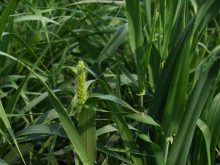Ontario’s barley and oat growers have voted just over three-quarters in favour of representation by the province’s wheat, corn and soybean growers’ organization.
Grain Farmers of Ontario (GFO) confirmed Monday that eligible growers voted 77 per cent in favour of the move in a November vote conducted by the Ontario Farm Products Marketing Commission.
GFO said the provincial commission has already begun the process to make the regulatory changes, which includes posting on the government regulatory registry for 45 days to invite any “additional comments” on the addition of barley and oats to the GFO mandate.
Read Also

India slaps 30 per cent import duty on yellow peas
India has imposed a 30 per cent duty on yellow pea imports with a bill of lading date on or after Nov. 1, 2025.
The aim, under that timeline, is to have the needed regulatory amendments finalized for July 1 this year, GFO said.
Once said amended regulations are in place, farmers selling barley and oats to licensed elevators or mills will be required to pay a license fee to GFO.
As is the case for wheat, corn and soy in the province, farm-fed and farmer-to-farmer sales of barley and oats wouldn’t be subject to the licence fees, GFO said.
The growers’ committee leading the push for GFO representation has previously said it expects GFO license fees for barley and oats to run at an estimated $1.30 and $1.65 per tonne respectively.
“To provide value”
The committee had been set up to manage oat and barley research allocations from the Ontario Farm Innovation Program (OFIP) after the Oat and Barley Council of Ontario was dissolved in 2010 following a 10-year run.
The committee was recognized at the Ontario Cereal Industry Research Council (OCIRC), but sought “more deliberate and effective representation” than a research-focused council could provide. The oat and barley council, the committee said, was a voluntary body and was “not sustainable because it did not have a reliable and sufficient revenue stream.”
The committee, on its website, said GFO would be expected to spearhead investment in research on higher-yielding varieties; help set up market development initiatives; and provide advocacy at the government and industry level to advance growers’ interests.
Barley and oats “are important to the grain industry in our province and we are keen to provide value to Ontario’s barley and oat farmers in the areas of research, market development, and advocacy,” GFO CEO Barry Senft said in Monday’s release.
GFO, in its release, also urged Ontario barley and oat growers to attend district grain committee meetings being held across the province this month. — AGCanada.com Network











